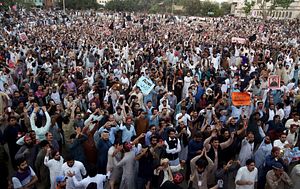On June 3, the “good Taliban” — “peace committee” members — pulled their triggers, killing at least four and injuring nearly 30 members and sympathizers of the Pashtun Tahaffuz (Protection) Movement (PTM) in Wana, at the center of Pakistan’s South Waziristan region.
This was the first time in five months that the unarmed PTM supporters were confronted with gun-wielding Taliban, believed to be the proxies of Pakistani security forces in the area.
Since its emergence in January, the PTM leadership, mostly comprising youth from the (then) tribal areas, has staged peaceful protest demonstrations across Pakistan.
Their key demands include an inquiry into all enforced disappearances by the Pakistani intelligence agencies, an end to curfews and allegedly humiliating behavior at military checkpoints, and due compensation for the human and material losses suffered by tribesmen during the numerous anti-Taliban operations by the Pakistani security forces over the past decade and half.
Addressing a news conference on June 4, Director-General of Pakistan’s Inter-Services Public Relations (ISPR) Major-General Asif Ghafoor said the PTM members were inciting anti-state sentiments. He said they were confronted by members of the “peace committee,” a term used to conceal the severity of the word “Taliban.”
Pakistan’s tribal areas, which have now been merged into the adjacent Khyber Pakhtunkhwa province through an amendment in the constitution, acted as center stage of the country’s fight against terrorism since 2001. Several key towns, including Wana, were once overtaken by the armed Taliban.
Pakistan had to conduct numerous military operations to reclaim these areas, but locals say they feel insecure. The presence of both armed groups and security forces is curtailing their freedom of movement and freedom of expression in their native towns and villages.
The locals sarcastically use the term “good Taliban” for the long-haired armed men whom the army euphemistically calls members of a “peace committee.”
The roots of the term “good Taliban” can be traced to what many believe is Pakistan’s so-called double game, which refers to the policy of fighting the Taliban groups attacking installations inside Pakistan and sparing the ones involved in fighting across the border in Afghanistan.
These also include the dreaded Haqqani Network, a group once described by then-U.S. CENTCOM Chief Admiral Mike Mullen as the “veritable arm of Pakistan’s Inter-Services Intelligence (ISI).”
The June 3 incident, involving the so-called “good Taliban,” was the result of years of frustration among the locals, who have been sandwiched between the various Taliban groups and the Pakistani security forces over the past decade and half.
The PTM leadership, who openly question the policy of thrashing some militants and sparing others, has also shattered the fear factor that kept the native Waziristanis from speaking against the high-handedness of the armed groups.
The presence of Ali Wazir, one of the most popular leaders of PTM after Manzoor Pashteen, in Wana was a challenge to the existence of the “good Taliban,” who, according to locals, are operating in four groups under four different commanders.
Besides taxing the businessmen and traders in Wana Bazaar, consisting of roughly 6,000 shops and kiosks, these Taliban groups are also acting as the sole arbiters of justice and dispute resolution in their respective areas.
After living under fear of the Taliban and the security forces for more than a decade, the PTM leadership has emboldened the tribesmen to challenge both sides by raising a voice against what they call injustices and gross violations of human rights. Locals say the June 3 confrontation in Wana was the first public reaction to the presence of “good Taliban.”
While the Waziristanis are now finding the courage to speak out, the apparently powerful media and the ruling elites are gradually losing their tongues.
While social media – mainly Twitter and Facebook – are bubbling with comments and posts supporting and sympathizing with the PTM agenda for peace and respect for human rights, the mainstream Pakistani media mostly downplayed the June 3 incident in Wana.
By the same token, none of the leading political parties either condemned the killing or expressed a word of sympathy for the people who were injured or those who lost their relatives.
The Wana killings happened at a time when leaders of the Pashtun Tahaffuz Movement were preparing to hold talks with the army-sponsored committees to resolve all the disputes. Since the youth of FATA were already suffering from a deepening sense of alienation, this fresh incident and the widespread silence will add insult to their injuries and it will further increase their frustration with the state, long accused of discrimination against the tribal people.
Daud Khattak is Senior Editor for Radio Free Europe Radio Liberty’s Pashto language Mashaal Radio. Before joining RFE/RL, Khattak worked for The News International and London’s Sunday Times in Peshawar, Pakistan. He has also worked for Pajhwok Afghan News in Kabul. The views expressed here are the author’s own and do not represent those of RFE/RL.

































